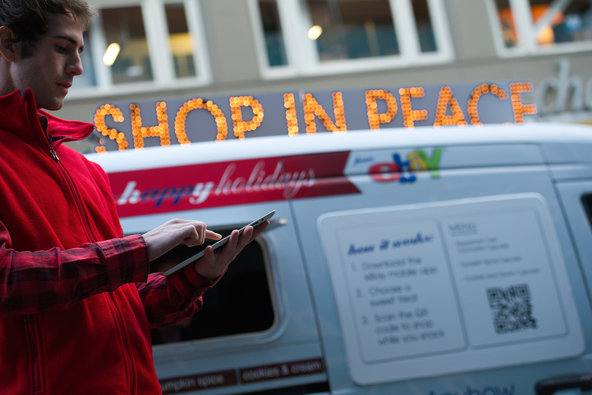 David Paul Morris/Bloomberg NewsShoppers spent much more money online this year than last year, and they did a lot of their shopping on tablets like the iPad.
David Paul Morris/Bloomberg NewsShoppers spent much more money online this year than last year, and they did a lot of their shopping on tablets like the iPad.
Little time remains for online shoppers to have gifts delivered in time for Christmas, and sales numbers for online shopping this season are arriving. The trends are clear: shoppers spent much more money online this year than last year, and they did a lot of their shopping on tablets like the iPad.
So far this holiday season, shoppers have spent $32 billion online, 15 percent more than last year, according to comScore. Last week was the heaviest online shopping week on record, and last weekend was the second-heaviest weekend. Though most sales from now to Christmas will take place in physical stores, some Web sites are still offering expedited shipping and online retailers will most likely sell another $5 billion to $6 billion in goods through the end of December, comScore said.
Gian Fulgoni, chairman of comScore and an e-commerce expert, called it “an outstanding season for online retailers.”
Shoppers are much more eager to use their mobile devices to browse and buy this year, though the evidence shows that they are more likely to use their phones for product research and turn to their tablets or computers when they are ready to buy.
Twelve percent of online visits to retailers’ Web sites came from mobile devices, up from 5 percent a year ago, according to IBM Benchmark, which tracks e-commerce. But just 9 percent of sales came from mobile phones.
While 79 percent of shoppers use their cellphones for research, just 58 percent have made purchases on their phones, according to TechBargains.com, a deal aggregation site. Meanwhile, 75 percent have made purchases on their tablets and 94 percent on their laptops.
Holiday sales at eBags.com show this behavior in action. Of the site’s total visits, 7 percent came from tablets and 5 percent from smartphones, but 7 percent of sales came from tablets while just 2 percent came from phones.
“Shopping via tablet picks up in the evenings, indicating consumers are coming home from work and turning on their iPads and shopping as they watch TV,” said Peter Cobb, co-founder and senior vice president of eBags.
But when deals hang in the balance and computers aren’t nearby, people are more than willing to turn to their phones and type their shipping address and credit card number on the tiny keyboard. Mobile commerce peaked at 10 p.m. on Cyber Monday, accounting for 20 percent of all retail traffic in the last two hours before online deals expired, according to Akamai, an Internet content delivery company.
Article source: http://feeds.nytimes.com/click.phdo?i=3a07f7c7b57d8476fa5b940137aa9d85
